Tobias C. Nauen
PRISM: Diversifying Dataset Distillation by Decoupling Architectural Priors
Nov 13, 2025Abstract:Dataset distillation (DD) promises compact yet faithful synthetic data, but existing approaches often inherit the inductive bias of a single teacher model. As dataset size increases, this bias drives generation toward overly smooth, homogeneous samples, reducing intra-class diversity and limiting generalization. We present PRISM (PRIors from diverse Source Models), a framework that disentangles architectural priors during synthesis. PRISM decouples the logit-matching and regularization objectives, supervising them with different teacher architectures: a primary model for logits and a stochastic subset for batch-normalization (BN) alignment. On ImageNet-1K, PRISM consistently and reproducibly outperforms single-teacher methods (e.g., SRe2L) and recent multi-teacher variants (e.g., G-VBSM) at low- and mid-IPC regimes. The generated data also show significantly richer intra-class diversity, as reflected by a notable drop in cosine similarity between features. We further analyze teacher selection strategies (pre- vs. intra-distillation) and introduce a scalable cross-class batch formation scheme for fast parallel synthesis. Code will be released after the review period.
Just Leaf It: Accelerating Diffusion Classifiers with Hierarchical Class Pruning
Nov 18, 2024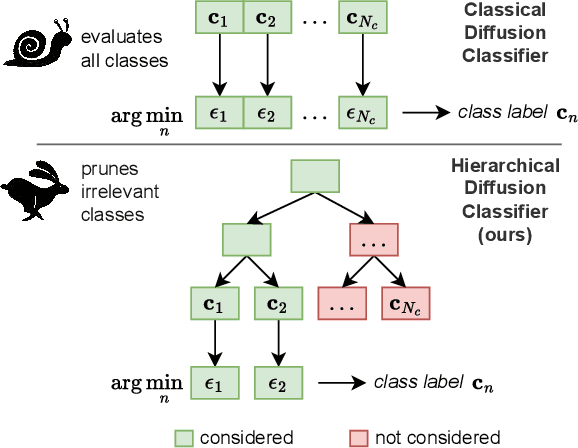

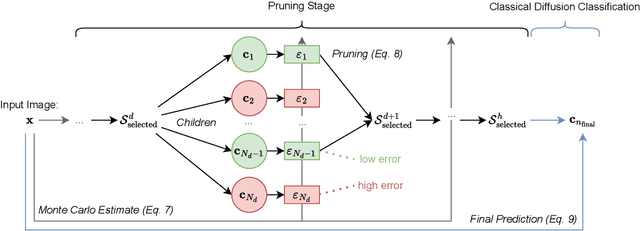

Abstract:Diffusion models, known for their generative capabilities, have recently shown unexpected potential in image classification tasks by using Bayes' theorem. However, most diffusion classifiers require evaluating all class labels for a single classification, leading to significant computational costs that can hinder their application in large-scale scenarios. To address this, we present a Hierarchical Diffusion Classifier (HDC) that exploits the inherent hierarchical label structure of a dataset. By progressively pruning irrelevant high-level categories and refining predictions only within relevant subcategories, i.e., leaf nodes, HDC reduces the total number of class evaluations. As a result, HDC can accelerate inference by up to 60% while maintaining and, in some cases, improving classification accuracy. Our work enables a new control mechanism of the trade-off between speed and precision, making diffusion-based classification more viable for real-world applications, particularly in large-scale image classification tasks.
Zoomed In, Diffused Out: Towards Local Degradation-Aware Multi-Diffusion for Extreme Image Super-Resolution
Nov 18, 2024



Abstract:Large-scale, pre-trained Text-to-Image (T2I) diffusion models have gained significant popularity in image generation tasks and have shown unexpected potential in image Super-Resolution (SR). However, most existing T2I diffusion models are trained with a resolution limit of 512x512, making scaling beyond this resolution an unresolved but necessary challenge for image SR. In this work, we introduce a novel approach that, for the first time, enables these models to generate 2K, 4K, and even 8K images without any additional training. Our method leverages MultiDiffusion, which distributes the generation across multiple diffusion paths to ensure global coherence at larger scales, and local degradation-aware prompt extraction, which guides the T2I model to reconstruct fine local structures according to its low-resolution input. These innovations unlock higher resolutions, allowing T2I diffusion models to be applied to image SR tasks without limitation on resolution.
Distill the Best, Ignore the Rest: Improving Dataset Distillation with Loss-Value-Based Pruning
Nov 18, 2024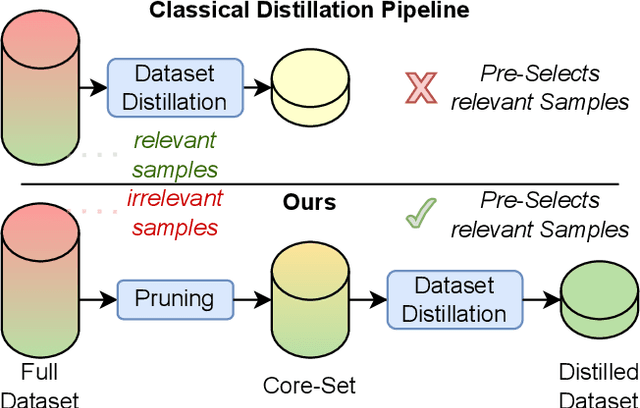

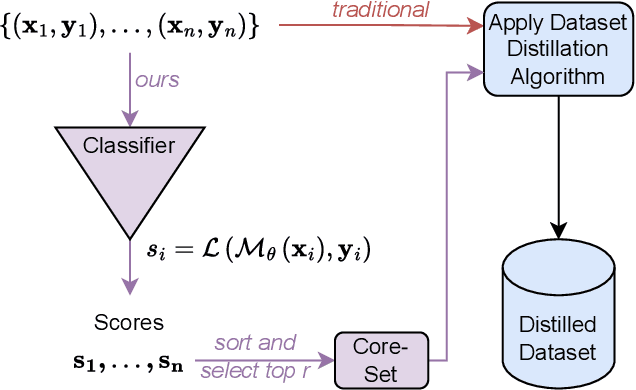
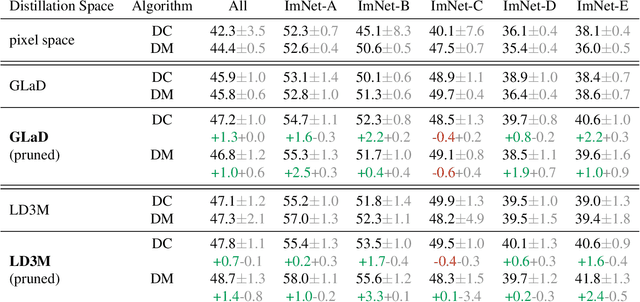
Abstract:Dataset distillation has gained significant interest in recent years, yet existing approaches typically distill from the entire dataset, potentially including non-beneficial samples. We introduce a novel "Prune First, Distill After" framework that systematically prunes datasets via loss-based sampling prior to distillation. By leveraging pruning before classical distillation techniques and generative priors, we create a representative core-set that leads to enhanced generalization for unseen architectures - a significant challenge of current distillation methods. More specifically, our proposed framework significantly boosts distilled quality, achieving up to a 5.2 percentage points accuracy increase even with substantial dataset pruning, i.e., removing 80% of the original dataset prior to distillation. Overall, our experimental results highlight the advantages of our easy-sample prioritization and cross-architecture robustness, paving the way for more effective and high-quality dataset distillation.
 Add to Chrome
Add to Chrome Add to Firefox
Add to Firefox Add to Edge
Add to Edge